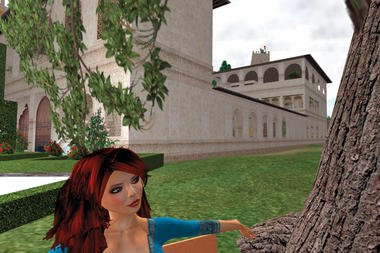A virtual world that breaks real barriers
 Rose Springvale is the avatar of Georgiana Nelsen, who cofounded Al-Andalus, a virtual world patterned after medieval Andalus in Spain, where Christians, Jews, and Muslims coexisted harmoniously under Islamic rule. [Courtesy of Rita King and Joshua Fouts]In Second Life's Al-Andalus, a virtual world patterned after medieval Andalus in Spain, avatars of Muslims mix with avatars of Jews and Christians to strive for a more perfect union.
Rose Springvale is the avatar of Georgiana Nelsen, who cofounded Al-Andalus, a virtual world patterned after medieval Andalus in Spain, where Christians, Jews, and Muslims coexisted harmoniously under Islamic rule. [Courtesy of Rita King and Joshua Fouts]In Second Life's Al-Andalus, a virtual world patterned after medieval Andalus in Spain, avatars of Muslims mix with avatars of Jews and Christians to strive for a more perfect union.[from Ethan Gilsdorf's article in the Christian Science Monitor]
Thus far in the relatively short existence of online worlds and virtual communities, less than flattering stories typically float to the surface. The Internet is rife with tales of bad behavior: antisocial "trolls" posting inflammatory messages; players addicted to fantasy role-playing games; and marriages ruined by spouses staying up half the night to flirt in virtual spaces, even proposing marriage to people they've never met in the flesh.
Given the power of negative thinking, it's worth repeating: Not all that happens within the digital realms of monsters, quests, and virtual dollars is evil. Much of the zombie-shooting amounts to people having fun or finding an escape. But some online communities embrace a more lofty mission. They're forging new relationships across the chasms of nationality, religion, and language – long the unrealized dream of some who hoped the Internet could bring us closer.
One such place is Al-Andalus, named after a real nation that once existed in the Iberian Peninsula. From the 8th to the 15th centuries, the spirit of la convivencia, "coexistence," ruled Spain. Christians, Muslims, and Jews lived together mostly harmoniously, and created a vibrant artistic, scientific, and intellectual community.
The volunteers who "built" Al-Andalus in Second Life, the virtual world created by company Linden Lab, wanted to re-create that utopian place, particularly in the wake of the intercultural ill will brewing since 9/11. Only their Al-Andalus is made of pixels, not bricks, and peopled not by humans but their digital doppelgängers, or avatars.
"I'm a pacifist. I'm a mother," says cofounder Georgiana Nelsen, a business lawyer practicing in Houston who in Second Life (SL) goes by "Rose Springvale" (and, informally, the "Sultana"). "I want to always teach 'Use your words, not your hands.' And so this appealed to my personal desire to do something positive in the world rather than continue to foster things that are divisive."
After nine months of construction, Al-Andalus opened its virtual doors in July 2007, and now has 350 contributing members and receives thousands of day-trippers. The democratically run community (and recognized nonprofit) is roughly one-quarter Jewish, one-quarter Muslim, and the remainder Christian and atheist. The massive virtual grounds include a re-creation of the Alhambra and Alcázar fortresses and palaces and the Great Mosque of Córdoba, plus a caravan market, library (run by a Smithsonian librarian), theater, and art center. People can attend a flamenco concert; a meeting; or a religious service in a synagogue, church, or mosque – or even ride a magic carpet for an aerial tour (almost 180,000 have done so).
Read the rest here at the Christian Science Monitor